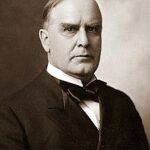The Decision for War
President William McKinley faced mounting pressure to intervene in Cuba’s struggle against Spanish rule. The USS Maine explosion in Havana Harbor on February 15, 1898, killed 266 American sailors. Yellow journalism inflamed public opinion, demanding military action against Spain. ⚔️ McKinley reluctantly asked Congress for war authorization on April 11, 1898. The McKinley Spanish American War began despite his initial preference for diplomatic solutions.
Imperial Acquisitions
The brief conflict ended with Spain’s decisive defeat in less than four months. The Treaty of Paris gave America control over Puerto Rico, Guam, and the Philippines. 🌍 Cuba gained independence under American protection through the Platt Amendment. McKinley justified these acquisitions as America’s duty to civilize and Christianize new territories. Critics argued this violated fundamental American principles of self-governance.
Constitutional Controversy
The McKinley Spanish American War sparked fierce debates about America’s constitutional limits. 💰 Anti-imperialists formed organized opposition, including the Anti-Imperialist League in 1898. Leaders like Andrew Carnegie and Mark Twain argued that ruling foreign peoples contradicted democratic ideals. The Supreme Court later addressed territorial governance in the Insular Cases of 1901.
Impact:
Birth of American Imperialism
The McKinley Spanish American War fundamentally transformed America’s global role and identity. The United States emerged as a colonial power, governing millions of foreign subjects. 🔥 This dramatic shift from isolationism to imperialism created lasting political divisions. Anti-imperialist opposition remained strong through the 1900 presidential election. The decision established precedents for future American overseas interventions and territorial acquisitions.
Philippine-American War Consequences
Filipino resistance to American rule erupted into a brutal three-year conflict. The Philippine-American War cost approximately 4,200 American and 20,000 Filipino lives. 📉 Military expenses far exceeded initial projections, straining the federal budget significantly. Guerrilla warfare tactics shocked American forces unprepared for unconventional combat. Reports of torture and civilian casualties damaged America’s moral reputation internationally.
Long-term Strategic Effects
American territorial expansion created new strategic responsibilities across the Pacific Ocean. 🌍 Naval bases in the Philippines and Guam projected American power toward Asia. The decision influenced subsequent foreign policy, including the Open Door Policy in China. However, defending scattered territories required massive military investments and permanent overseas commitments. This imperial burden continued to shape American foreign policy throughout the twentieth century.
